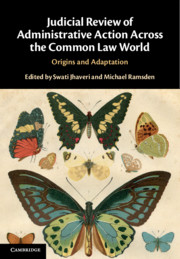27 results
14 - English Administrative Law in Post-Handover Hong Kong
- from Part VI - Origins and Adaptations in Asia
-
-
- Book:
- Judicial Review of Administrative Action Across the Common Law World
- Published online:
- 19 March 2021
- Print publication:
- 18 March 2021, pp 255-272
-
- Chapter
- Export citation
Part VIII - Conclusion: Interrogating “Common Law” Approaches to Judicial Review
-
- Book:
- Judicial Review of Administrative Action Across the Common Law World
- Published online:
- 19 March 2021
- Print publication:
- 18 March 2021, pp 347-373
-
- Chapter
- Export citation
Acknowledgments
-
- Book:
- Judicial Review of Administrative Action Across the Common Law World
- Published online:
- 19 March 2021
- Print publication:
- 18 March 2021, pp xv-xv
-
- Chapter
- Export citation
Contributors
-
- Book:
- Judicial Review of Administrative Action Across the Common Law World
- Published online:
- 19 March 2021
- Print publication:
- 18 March 2021, pp viii-xii
-
- Chapter
- Export citation
Part IV - Origins and Adaptations in North America and Canada
-
- Book:
- Judicial Review of Administrative Action Across the Common Law World
- Published online:
- 19 March 2021
- Print publication:
- 18 March 2021, pp 115-156
-
- Chapter
- Export citation
Part II - Origins and Adaptations of Judicial Review in England
-
- Book:
- Judicial Review of Administrative Action Across the Common Law World
- Published online:
- 19 March 2021
- Print publication:
- 18 March 2021, pp 25-78
-
- Chapter
- Export citation
Index
-
- Book:
- Judicial Review of Administrative Action Across the Common Law World
- Published online:
- 19 March 2021
- Print publication:
- 18 March 2021, pp 374-392
-
- Chapter
- Export citation
Copyright page
-
- Book:
- Judicial Review of Administrative Action Across the Common Law World
- Published online:
- 19 March 2021
- Print publication:
- 18 March 2021, pp iv-iv
-
- Chapter
- Export citation
Part III - Origins and Adaptations in the British Isles
-
- Book:
- Judicial Review of Administrative Action Across the Common Law World
- Published online:
- 19 March 2021
- Print publication:
- 18 March 2021, pp 79-114
-
- Chapter
- Export citation
Foreword
-
- Book:
- Judicial Review of Administrative Action Across the Common Law World
- Published online:
- 19 March 2021
- Print publication:
- 18 March 2021, pp xiii-xiv
-
- Chapter
- Export citation
Table of Legislation
-
- Book:
- Judicial Review of Administrative Action Across the Common Law World
- Published online:
- 19 March 2021
- Print publication:
- 18 March 2021, pp xxxix-lii
-
- Chapter
- Export citation
Part I - Introduction
-
- Book:
- Judicial Review of Administrative Action Across the Common Law World
- Published online:
- 19 March 2021
- Print publication:
- 18 March 2021, pp 1-24
-
- Chapter
- Export citation
Part V - Origins and Adaptations in the Middle East and Africa
-
- Book:
- Judicial Review of Administrative Action Across the Common Law World
- Published online:
- 19 March 2021
- Print publication:
- 18 March 2021, pp 157-212
-
- Chapter
- Export citation
Abbreviations
-
- Book:
- Judicial Review of Administrative Action Across the Common Law World
- Published online:
- 19 March 2021
- Print publication:
- 18 March 2021, pp liii-liv
-
- Chapter
- Export citation
Part VII - Origins and Adaptations in Australasia
-
- Book:
- Judicial Review of Administrative Action Across the Common Law World
- Published online:
- 19 March 2021
- Print publication:
- 18 March 2021, pp 307-346
-
- Chapter
- Export citation
4 - International Influences on English Judicial Review and Implications for the Exportability of English Law
- from Part II - Origins and Adaptations of Judicial Review in England
-
-
- Book:
- Judicial Review of Administrative Action Across the Common Law World
- Published online:
- 19 March 2021
- Print publication:
- 18 March 2021, pp 60-78
-
- Chapter
- Export citation
Part VI - Origins and Adaptations in Asia
-
- Book:
- Judicial Review of Administrative Action Across the Common Law World
- Published online:
- 19 March 2021
- Print publication:
- 18 March 2021, pp 213-306
-
- Chapter
- Export citation
Contents
-
- Book:
- Judicial Review of Administrative Action Across the Common Law World
- Published online:
- 19 March 2021
- Print publication:
- 18 March 2021, pp v-vii
-
- Chapter
- Export citation
Table of Cases
-
- Book:
- Judicial Review of Administrative Action Across the Common Law World
- Published online:
- 19 March 2021
- Print publication:
- 18 March 2021, pp xvi-xxxviii
-
- Chapter
- Export citation

Judicial Review of Administrative Action Across the Common Law World
- Origins and Adaptation
-
- Published online:
- 19 March 2021
- Print publication:
- 18 March 2021



